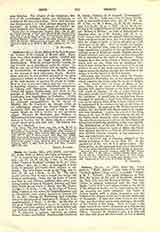

Cedd (or CEDDA), Saint, Bishop of the East Saxons, the brother of St. Ceadda; d. October 26, 664. There were two other brothers also priests, Cynibill and Caelin, all born of an Angle family settled in Northumbria. With his younger brother Ceadda, he was brought up at Lindisfarne under St. Aidan. In 653 he was one of four priests sent by Oswiu, King of Northumbria, to evangelize the Middle Angles at the request of their ealdorman, Peada. Shortly after, however, he was recalled and sent on the same missionary errand to Essex to help Sigeberht, King of the East Saxons, to convert his people to Christ. Here he was consecrated bishop and was very active in founding churches, and established monasteries at Tilbury and Ithancester. Occasionally he revisited his native Northumbria, and there, at the request of Aethelwald, founded the monastery of Laestingau, now Lastingham, in Yorkshire. Of this house he became the first abbot, notwithstanding his episcopal responsibilities. At the Synod of Whitby, like St. Cuthbert, he, though Celtic in his upbringing, adopted the Roman Easter. Immediately after the synod he paid a visit to Lsestingwu, where he fell a victim to the prevalent plague. Florence of Worcester and William of Malmesbury in later times counted him as the second Bishop of London, but St. Bede, almost a contemporary, never gives him that title. His festival was kept on January 7.
EDWIN BURTON

